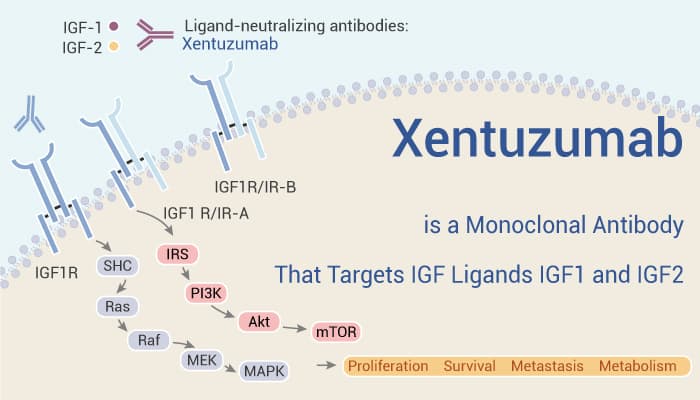IGF, an insulin-like growth factor, regulates cell growth, proliferation, and survival. The IGF system is made up of IGF1, IGF2, insulin, and corresponding receptors. It transmits abnormal signals to cause a variety of cancers. One that stands out is castration-resistant prostate cancer. IGF can either up-regulate IGF-binding proteins or recover IGF1 receptor expression, leading to a castration-resistant state. IGF also mediates the phosphorylation of specific androgen receptor (AR) sites to regulate AR nuclear localization signal. Moreover, it still induces transactivation of AR in the absence of androgens. It is conceivable that prostate cancer cells proliferate in an androgen-dependent manner. So, androgen deprivation and IGF-targeted therapy are required to inhibit tumor progression in prostate cancer. Here is Xentuzumab introduction, a humanized monoclonal antibody. It targets IGF-1/2 and blocks the proliferation/anti-apoptotic signals of IGFs.
Xentuzumab targets IGF-1/2 and exhibits excellent in vitro and in vivo efficacy.

Xentuzumab (0.1 μM; 24 h, 72 h) significantly inhibits IGF-1R and AKT serine/threonine kinase (AKT) phosphorylation and blocks IGF and AR signaling. And it also (0.1 μM; 24 h, 72 h) inhibits the phosphorylation of direct substrates of AKT, FoxO3a, and FoxO1. Xentuzumab together with Enzalutamide (androgen receptor inhibitor) has excellent synergy. Specifically, Xentuzumab (0.01 nM-1 μM; 5-10 d) with a 10-fold dose of Enzalutamide, shows anti-proliferative activity against prostate cancer cell lines. Collaborate with Xentuzumab (1 μM; 72 h) and Enzalutamide (10 μM; 72 h) also induce apoptosis in VCaP cells via arresting cell cycle in the sub-G1 phase. Meanwhile, They activate caspase activity and increases cleaved PARP and caspase-3 protein level.
Xentuzumab exhibits potent efficacy in the LuCaP 96CR PDX model in vivo. The model is resistant to Enzalutamide, Xentuzumab (200 mg/kg; i.p.; once weekly for 10 weeks) resensitize tumors to Enzalutamide (30 mg/kg p.o.; 5 days on, 2 days off, for 10 cycles). More importantly, Xentuzumab inhibits tumor growth and leads to survival improvement.
Above all, Xentuzumab is an efficient IGF-1/2 mAb, which leads to AR signaling suppression, and IGF/IGF-1R activity compensatory. It has great in vitro and in vivo efficacy.
Reference:
[1] Weyer-Czernilofsky U, et al. Mol Cancer Ther. 2020 Apr;19(4):1059-1069.